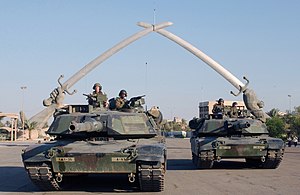Edited by Laurence Bouvard

Ten Years Since the Start of the Iraq War
In the end we cannot know the exact number of victims, but according to various sources the war took between 130,000 and 1 million lives. In December of 2011, the U.S. Army left the country, signifying the end of the stated mission, the legitimacy of which was regarded skeptically by military and civilian analysts around the world and even in the U.S.A. Costs of the war to the United States exceeded $2 trillion; of that amount, $1.7 trillion was spent on military operations and $490 billion on payments to veterans. However, according to recent research conducted at the Watson Institute for International Studies at Brown University, over the next 40 years that amount will likely grow to $6 trillion due to so-called hidden costs.
Now, 10 years later, it appears clear that Iraq did not become a free and flourishing country. Tensions within the government have hardly been eased, and armed conflicts and terrorist attacks continue.
The key question: What are the outcomes of the war in Iraq? Odnako discussed the topic with Yevgeny Satanovsky, president of the Middle East Institute:
Iraq does not exist as a state. There is a territory contained within borders once occupied by Iraq. This territory is that of a civil war of all against all. Secular Sunnis against al-Qaida, Shiites against Sunnis, Arabs against Kurds, Kurds against Turkmens and Arabs. The only more or less stable region within Iraqi territory is the north — Kurdistan, which will soon separate. Once Erbil finally concludes talks with Turkey to build a pipeline, which would allow the export of oil independent of Baghdad, little will continue to connect Kurdistan to the rest of Iraq.
The country has fallen into Iran’s zone of influence — which was inconceivable even under Saddam Hussein — elevating Iran practically to the position of a regional superpower. Iran’s nuclear program has proceeded at triple speed because it realized that if you have weapons of mass destruction, you will not be touched — like North Korea has not been touched. If you don’t have them, your country will be crushed, and you will be either hanged like Saddam Hussein or lynched like Gadhafi.
Tensions have been heightened throughout the whole region. A series of secular authoritarian dictators have been overthrown and their regimes brought down. There has been real destruction: Tunisia, Libya, Egypt, the civil war in Syria. All of these are extended consequences of what happened in Iraq.
Does this mean that the Americans are intentionally sowing the seeds of controlled or uncontrolled chaos? Of course not — although they showed the same nonchalance in entering adventures vis-à-vis unsavory characters like Saddam Hussein as they did when they refrained from intervening during the overthrow of close allies like Mubarak, much as Jimmy Carter did not help the Iranian Shah.
Over these 10 years it has become clear what the Americans and their allies can and cannot do. In the Middle East this greatly helped al-Qaida; and, of course, Saudi Arabia was relieved of its most dangerous neighbor. Apart from Iran, it now faces absolutely no threats. For the Saudis, it was a highly successful operation, and to a considerable extent they pulled the United States into it. There is one outcome.
The portrait of Bush senior no longer hangs in the Baghdad Airport, and those traveling to Iraq no longer walk past it. Saddam Hussein was overthrown and hanged — a good outcome.
Who really entangles themselves in an intervention for the sake of someone else’s freedom? Let’s distinguish agitation and propaganda from reality. Condoleezza Rice — I talked to her before the war during President Bush’s visit in St. Petersburg — hoped that Iraq would become a democracy. There is democracy in Iraq.
At the same time, of course, there is a civil war that has killed about 1 million people and created 5.5 million refugees and displaced persons — but is there democracy? There is. Do the people vote? They vote. But what is the importance of that question? Like Iosseliani said, “The desire of democracy is not to have to eat your lobio*.” President Bush wanted the offensive portrait of his dad removed. Is the portrait gone? It’s gone. Which is also good. Finally, Dick Cheney, who was then vice president, took care of oil business along with the company Haliburton and was quite successful early on. In the reconstruction of Iraq he looted even more than he did from oil — so everyone got what they wanted.
*Translator’s note: Lobio is a Georgian bean dish.

